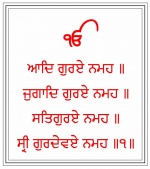Template:AOW101: Difference between revisions
Hari singh (talk | contribs) No edit summary |
Hari singh (talk | contribs) No edit summary |
||
| Line 7: | Line 7: | ||
It is a lengthy masterpiece, written by [[Guru Arjan Dev]], the fifth [[Sikh Guru]]. The sacred prayer spans 35 pages from page {{sggs-page|262|11586}} to page {{sggs-page|296|13612}} of the [[Guru Granth Sahib]]. | It is a lengthy masterpiece, written by [[Guru Arjan Dev]], the fifth [[Sikh Guru]]. The sacred prayer spans 35 pages from page {{sggs-page|262|11586}} to page {{sggs-page|296|13612}} of the [[Guru Granth Sahib]]. | ||
Surprisingly, many ardent [[Sikh]]s include the recitation of this [[Bani]] in their daily regimen of [[Nitnem]] | Surprisingly, many ardent [[Sikh]]s include the recitation of this [[Bani]] in their daily regimen of [[Nitnem]]. | ||
The location is still marked on the bank of the [[Ramsar]] pool in the city of [[Amritsar]], near the famous [[Golden Temple]] or [[Harimandir Sahib]]. | The physical site where, around AD 1602-03, the Guru composed this [[Gurbani]] was once enclosed by a dense wood. The location is still marked on the bank of the [[Ramsar]] pool in the city of [[Amritsar]], near the famous [[Golden Temple]] or [[Harimandir Sahib]]. | ||
It is said that [[Baba Sri Chand]], elder son of [[Guru Nanak]] and founder of the [[Udasi]] order, came to [[Amritsar]] to meet [[Guru Arjan]], then engaged in composing this [[Bani]]. The Guru who had by that time completed sixteen [[astpadi]]s, or cantos, requested him to continue the composition. | It is said that [[Baba Sri Chand]], elder son of [[Guru Nanak]] and founder of the [[Udasi]] order, came to [[Amritsar]] to meet [[Guru Arjan]], then engaged in composing this [[Bani]]. The Guru who had by that time completed sixteen [[astpadi]]s, or cantos, requested him to continue the composition. | ||
[[Baba Sri Chand]], out of humility, only recited the [[salok]] of [[Guru Nanak]] following the [[Mool Mantra]] in the [[Japji]] <!----- — ''“adi sachu, jugadi sachu; hai bhi sachu, Nanak hosi bhi sachu”'' — ''"True in the beginning, True through the ages; True even now; Nanak say, Shall remain ever True"'' (SGGS p285). This [[salok]] was thereupon repeated by [[Guru Arjan]] at the head of the seventeenth [[astpadi]].------> {{aowf|Sukhmani}} | [[Baba Sri Chand]], out of humility, only recited the [[salok]] of [[Guru Nanak]] following the [[Mool Mantra]] in the [[Japji]] <!----- — ''“adi sachu, jugadi sachu; hai bhi sachu, Nanak hosi bhi sachu”'' — ''"True in the beginning, True through the ages; True even now; Nanak say, Shall remain ever True"'' (SGGS p285). This [[salok]] was thereupon repeated by [[Guru Arjan]] at the head of the seventeenth [[astpadi]].------> {{aowf|Sukhmani}} | ||
Latest revision as of 07:01, 4 August 2012
Sukhmani or Sukhmani Sahib is the title given to the Gurbani in raga Gauri Sukhmani in the Guru Granth Sahib which in turn appears in the major musical measure Raga Gauri to which it belongs.
It is a lengthy masterpiece, written by Guru Arjan Dev, the fifth Sikh Guru. The sacred prayer spans 35 pages from page 262 to page 296 of the Guru Granth Sahib.
Surprisingly, many ardent Sikhs include the recitation of this Bani in their daily regimen of Nitnem.
The physical site where, around AD 1602-03, the Guru composed this Gurbani was once enclosed by a dense wood. The location is still marked on the bank of the Ramsar pool in the city of Amritsar, near the famous Golden Temple or Harimandir Sahib.
It is said that Baba Sri Chand, elder son of Guru Nanak and founder of the Udasi order, came to Amritsar to meet Guru Arjan, then engaged in composing this Bani. The Guru who had by that time completed sixteen astpadis, or cantos, requested him to continue the composition.
Baba Sri Chand, out of humility, only recited the salok of Guru Nanak following the Mool Mantra in the Japji .....More

